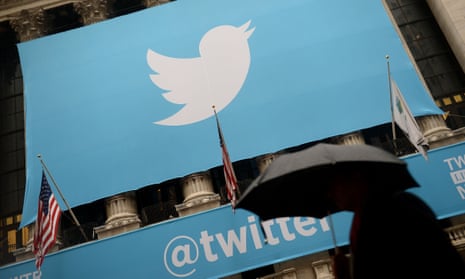Twitter has deleted more than 125,000 accounts linked to terrorists since mid-2015, the company announced, offering some of the most detailed insight yet of how Silicon Valley is collaborating with western governments in its fight against Islamic State.
The social media company is relying on a mix of human judgment and technology, developing teams of specialists in the US and Ireland that comb through thousands of suspect accounts.
Isis has also been linked to automated accounts, or “bots”, that churn out extremist rhetoric. These automated accounts can sometimes be caught with tools normally used to fight spam.
“We condemn the use of Twitter to promote violent terrorism,” the company said in a statement on 5 February. “This type of behavior, or any violent threats, is not permitted on our service.”
Twitter and other tech companies have long policed their content for signs of Islamic extremism. Until recently they have not been willing to discuss the details of their policies or procedures, which have been viewed as controversial because of the complex and political nature of the judgments behind removing messages.
The procedures require Twitter’s specialists to make tough calls on individual tweets and accounts, including to what degree a message is euphoric, controversial or extremist.
These efforts also create risks for the company, which has frequently defined itself as a home for free speech and open debate. In 2014, then-Twitter chief executive Dick Costolo said he had received death threats over Twitter’s removal of Isis content.
But western politicians increasingly have applied pressure on US technology firms to become more of an active combatant in its fight against Islamic extremism. So far, Silicon Valley appears to be receptive.
Speaking in Davos last month at the World Economic Forum, Facebook COO Sheryl Sandberg suggested Isis could be quelled by posting anti-Isis content on Facebook. In a closed-door meeting last month in San Jose with US national security officials, she and other technology executives discussed the idea of using an algorithm to try and automatically flag Isis content.
Meanwhile, Google executives have discussed the idea of forcing Isis operatives off the public internet.
Twitter is free, international and allows anyone to sign up for an account and post what they please, which has made it an attractive recruiting tool for terrorists. In 2015, the US military killed a British national-turned-Isis-hacker Junaid Hussain partly because of how he used Twitter to plot attacks on the west.
In its statement Friday, Twitter said it has seen “an increase in account suspensions and this type of activity shifting off Twitter”.
But the company pushed back against the growing idea that Silicon Valley can invent a formula to spot this traffic online automatically. “There is no ‘magic algorithm’ for identifying terrorist content on the internet,” a spokesman said. “Global online platforms are forced to make challenging judgement calls based on very limited information and guidance.”
At a forum in Palo Alto last month, a Facebook spokeswoman said much the same.
“I have been at Facebook for three months and I have yet to see that magical algorithm,” said Anne Kornblut, the company’s director of strategic communications, according to a report in the San Jose Mercury News.
